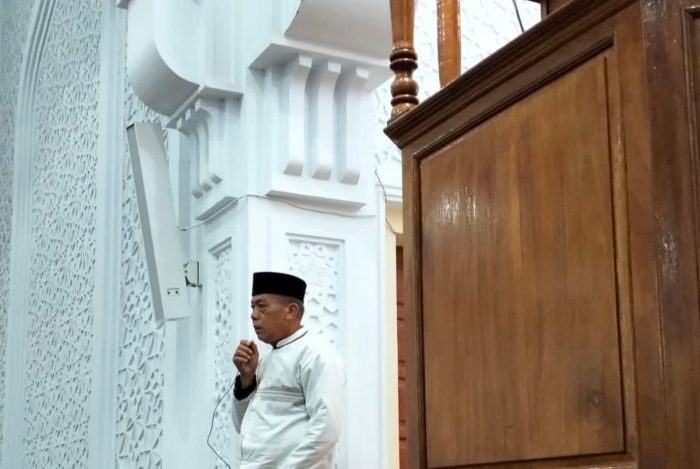Joni MN, Aman Rima*
kin suderengku bebewene, kadang ara salah cerak urum salah coret buge enti sawah kin barah hate, ku tiro semawah urum utok kepalan’ku tabi urum ma’af ku kite bewene, ampun ku Tuhen, buge nguk i ma’af-pen
Symbolic power thus generates capital that is based on the mutual recognition of attributes such as honour, nobility, politeness that are “only available to agents endowed with dispositions adjusted to the logic of ‘disinterestedness’” (Bourdieu 1997:234-235)[1].
A. REFLECTED AND ENGLISH
The language that is got-out from the mouth, gesture, body language is expression and reflection of our characteristic and moral. With the language the audience, whom a teacher can be hurting and make the people’s feeling is not balmy, but the language also can make students or the people balmy and happy.
The most important tenet of Brown and Lavinson’s original text on politeness theory is that we change our language based on hearer and thus our strategies for compliance gaining change depending on audience. In everyday life, we design messages that protect face and achieve other goals as well. Politeness is the expression of the speaker’s intention to mitigate face threats carried by certain face threatening acts toward another. Much of the work on politeness assumes that the listeners and speakers are all homogenous. However, gender needs play more prominently, politeness. Although it is well-established that women and men communicate differently, politeness theory has ignored the fact that based on gender, women and men will also perform politeness differently. Along the same lines, politeness is also stereotypically linked with class.
English is the largest, first time foreign language in Indonesia is primarily too utilized for the development of Technology, Art science and formation, strengthening of the relationships among other nations of the world (Depdiknas, 2001: 8). “UU. RI No.20” (2003, p. 24) stated that; The Foreign Language can be used as medium of instruction at set of certain education to support the ability has foreign Language for competition education. Therefore Indonesia is obligated to provide English as subject.
As previous in above, that the language is a systematic tool (Brown, 2001: 4) meaning that is used to convey ideas or feelings (by using that has meaning), (and Ares Toteles stated that the language is a result of the mind). Essentially it is communication through the use of messages, in order to send the message effectively communicant must send a message that is a clear without defects, in other this is a need to concentrate on the (appropriateness of the Language). Then Brown also stated that, “Language is a guide to “social”, pattern behavior (2001: 11)”. So, language is the guidance of social reality and a pattern of the human behavior for living.
Vygotsky as Psychologist correlated between language meaning and thinking development, Vygotsky stated that in wide perspective progressively which is given to something, so that, progressively goodness of the somebody’s idea (copied by “H.A.R Tilaar”, in 2004: 192). H.A.R Tilaar connecting between Languages with Socio-culture. Human being use the language in social context either in the meaning or in the translation, therefore, there is a need to manipulate quality and standard of the language though process and thoughts this will as a result thinking, stimulate higher cognitive processing. on other hand vygotsky state that the language also form persons character, the better the language used by the individual the better the character of individual (Vygotsky in H.A.R Tilaar’s Book, 2004:192-195).
Skill is the Language, non for the sake of language itself (Depdikbud, 1996: 1). In KBK (2004: 9) that learning English in Indonesia to varieties aiming in culture context, such as; 1). To develop of communication skill to educate them can interpret and to say of the thinking, 2). The students conduct of contemplation about using full, essence, and work-system of English language, 3). Understanding of Costume or mores, so students know the aptitude and also know the relation between Language and culture. And in KBK (2004: 8) function of English teaching is to develop of esthetic, art and technology, capability of international communication, thereby, they get skillful and Indonesian personality.
B. ETIQUETTE
Language is true own the central role in intellectual growth, social, and emotional. Important so this Language in life goes into society the, nation, and have state to so that need a policy which have implication of construction and study in education institute. One of construction form assumed by most strategic is Language study at school. In KTSP, Language is included in group of esthetics. Subject. This group also represents one of prop from group of august behavior and religion. August Behavior scope includes; cover the ethics, ethic kindness, or moral. Represents one of prop from group of august behavior and religion. August Behavior scope includes; cover the ethics, ethic kindness, or moral. Symbolic power thus generates capital that is based on the mutual recognition of attributes such as honour, nobility, politeness that are “only available to agents endowed with dispositions adjusted to the logic of ‘disinterestedness’” (Bourdieu 1997:234-235)[2].
Speaking well and using the sentences also well, in Holy Book of Muslim “The AL-Qur’an” ALLAH commanding; “be say to the slave of ALLAH the words which better and truly (Al-Isra’: 53), then how to use of our tongue and also mouth, this is strengthened in surah Hujarat- 12 “be careful with your tongue or mouth” this aim to speak polite and just beneficial.
And also the Gesture is strengthened by Prophet (Muhammad S.A.W) polite; be do not you underestimating some goodness though it just to show the beam of the face in front of your friends or the peoples environment (History by Al-Bukhari and Muslim). Talking about politeness. Our Prophet Muhammad S.A.W has never troubled himself in discussion; he only aims to so that not converse just harsh. So, the people who is very lucky or very loss that depended to, how they to use of their mouth or tongue.
The Politeness or Etiquette these are come to the Pragmatic aspect in speaking or in daily habit, politeness is also as The Intrinsic motivation which comes up from the learners or speaker self. Therefore the teachers’ roles are very need to instructing of the students. In another dictionary it is stated that; learning system is method by which learning is organized in a particular time or space, e.g. learning by repetition, “curriculum development”, and learning theory is specific or general theory of learning often associated with a particular “psychologist or psychological” school (International dictionary of education, G.Terry Page and J.B.Thomas, A.R. Marshall: 1980, p.202-203). The wrriter’s think, that the speaking with the others people and when ther teacher the english for the students must be polite cause of the language which is used as the communication tools possible make the opendeed, make the other ones angry, and soon, as the old parent in Gayonese said, that : i bibir i salit tikel, i delah i ubun santan, ike i ate turah mutentu inget ti tuhen si munetah tentu manusia.[3] Its means, we have to speak or communicate with the others well, the speaking which is come-out the mouth should get it from the sicerity of heart, then sure ALLAH will be guidence us, speaking politely or well there is no less, even it make us success in communication, and the others will good respond and thinking.
“Tikel bersalit cerak mutentu, santan lemak berdelam munemah tetah ku-ate si bijak kin cerak segere sergak”
(as the honey stroked in the lip, as the coco-nut milk is tested to carry-on it into the soul for speaking quite well)
(JONI MN, 2011)
Reading Sources
- Bourdieu, Pierre. 1977. [1972]. Outline of a Theory of Practice. Translated by R. Nice. Cambridge: Cambridge University Press.
- —. 1990. [1980]. The Logic of Practice. Translated by R. Nice. Stanford: Stanford University Press.
- —. 1991. [1982]. Language and Symbolic Power. Translated by G. Raymond and M. Adamson. Cambridge: Harvard University Press.
- —. 1997. “Marginalia — Some Additional Notes on the Gift.” Pp. 231-241 in The Logic of the Gift: Toward an Ethic of Generosity, edited by A. D. Schrift. New York: Routledge.
- —. 1998. [1994]. Practical Reason: On the Theory of Action. Stanford: Stanford University Press.
[1] Watts, Politeness – 3, Canadian Journal of Sociology Online January-February 2005, Politeness. Cambridge University Press, 2003, 318
[2] Melanie White is the author of a number of articles on civility, character and citizenship. Previously, she has held a Canada Research Chair Postdoctoral Fellowship in Citizenship Studies (2003) and a Social Sciences and Humanities Research Council of Canada Postdoctoral Fellowship (2004).pp.3
[3] Interviewing :Anan pedih (94 thn), Simpang Tige Redelong, discussion about Politenes and how to speak well as the gayonese culture, date: 31 Agustus 2011.





